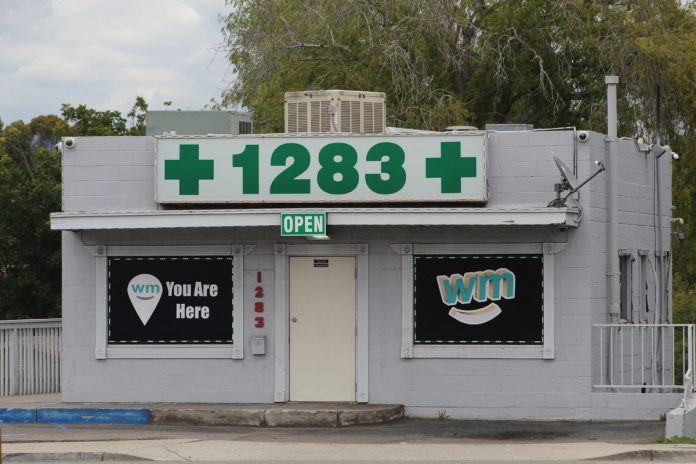
The Southwest Chula Vista Civic Association is holding a meeting on Thursday, Feb. 28, at the South Chula Vista Library to discuss problems related to marijuana dispensaries in Chula Vista, following the November passage of Measure Q.
The tax measure removed the final roadblock from legalizing medical and recreational cannabis dispensaries in the city, and an ordinance has since been put in place that allows three retail licenses and up to 10 indoor cultivator licenses per district.
The city can also issue an unlimited amount of manufacturer, distributor and testing laboratory licenses.
Theresa Acerro, president of the SWCVCA and meeting organizer, said an overpopulation of places to buy pot is bad for the city.
“A lot of us are not happy, we don’t think this is the way to go,” she said. “This is not our idea of what Chula Vista is.”
The meeting, which is being called Problems with Legal Cannabis, will include guest speakers, such as City Attorney Glen Googins, and will focus on ways to stop illegal pot shops and come up with a plan to limit the coming influx of legal dispensaries.
“It was last year when people were asked if they really wanted to see Chula Vista be the largest market in the entire county, and all of our members at that time said no,” Acerro said.
The passing of Prop 64 in 2016 legalized marijuana for recreational use in the state of California, and set the wheels in motion for the new regulations in Chula Vista, which had previously banned both recreational and medical marijuana dispensaries.
This did not stop pot shops from springing up, however, following California’s shift to becoming a more bud-friendly state.
“I think people felt empowered to jump out there and open up their illegal businesses,” said Chula Vista Deputy City Manager Kelley Bacon. “Some of those dispensaries were probably here, but it certainly became more prevalent after the passage of Prop 64.”
According to Bacon, the city has a team of people dedicated to finding and shutting down the illegal shops, and estimated that they have closed down approximately 50 so far.
“Our goal would be to have them all closed down before we open up the legal ones, but there’s no guarantee that you’re ever going to get everybody,” she said.
Bacon said she expects some shops to be up-and-running by the end of the year, but cautioned that others may end up taking up to three years to open their doors to the public.
One potential incentive for following the law is that anyone caught running an illegal dispensary will receive an automatic ban from ever getting a license to sell.
“We’ve made it very clear from the beginning that if you operate illegally in our city you are banned from getting a license here,” Bacon said. “Some of them may think we don’t know who they are but typically we do.”
The Chula Vista City Council previously cracked down on illegal dispensaries in 2017, going for the wallet of illegal dispensary owners when it voted to increase a fine to $2,500 a day, while simultaneously getting rid of the rule that a shop could only be fined up to $100,000.
Today, Chula Vista “potrepreneurs”—entrepreneurs in the cannabis industry— are forced to pay thousands in application and other fees to potentially get their businesses started.
Additionally, accepted shops will be looking at a tax rate of 5-15 percent of all gross receipts, while cultivators will pay between $5-$25 per square foot of canopy space, thanks to Measure Q.
Acerro said the city has money on its mind when it comes to cannabis.
“The problem here is the city has severe financial problems and they’re thinking this is some way out of it,” she said.
Chula Vista is projected to have a $7.1 million deficit for the fiscal year of 2020 and a $28.9 million deficit for 2028, according to a finance report released in September of last year.
Once the legal dispensaries are up and running, the city is estimating they will generate around $6 million in tax revenues each year.
Nicole Connors, founder and CEO of Washington State-brand Saku Cannabis, considered applying to own a dispensary in Chula Vista, and said residents should take the economic impact into account.
“This is an additional revenue stream for your city,” she said. “Your city can back the cannabis industry and what that does is it brings new lifeblood into the community.”
What’s in-and-around the community right now, according to the SWCVCA, is nine illegal dispensaries currently operating in the southwest, with 14 still up city-wide.
Acerro said in addition to the shops still being up-and-running, the current distance requirements set by the ordinance are a problem.
“People can be across the street from a park or school depending on the size of the block,” she said. “Or the school could be behind them. That is ridiculous.”
Current ordinance-regulations, which comply with California requirements, stipulate that storefront retailers should not be located within 1,000 feet of day care centers or public/private K-12 schools, 600 feet of any treatment facility, youth center youth-oriented business, public or private park and within 150 feet of any residential zone.
There are less separation requirements for non-storefront retailers, which must only not locate within 150 feet of residential zones.
Ultimately, the issue, for Acerro, is the children.
“It just kind of sends a message to kids that this is OK. This is something that we should do. We just need to get older and it’s like a rite of passage,” she said. “That’s the wrong message to be sending them.”















The message we’re currently sending children, with a liquor store on every block, is that alcohol is a better choice. That the proper right of passage to adulthood is through the doors of King’s Liquor on 3rd Ave and not Cannavista’s. We’d be a better, safer, healthier society if we made it as difficult to get alcohol as we currently make it to get cannabis. If Acerro and her group are as concerned as she claims to be, she’d know that 90,000 people die from alcohol-related causes every year, not cannabis. The Southwest Chula Vista Civic Association needs a civics lesson.